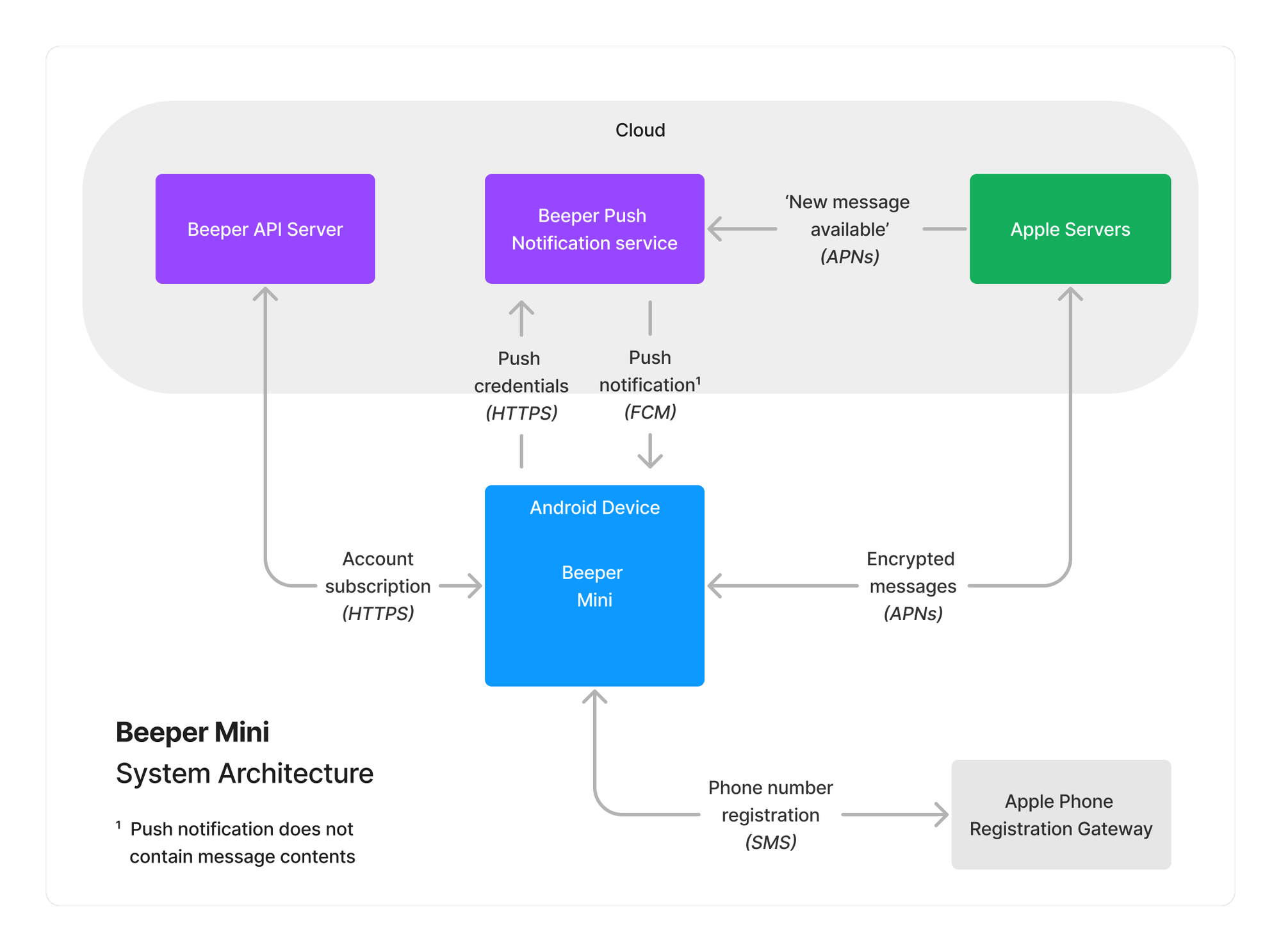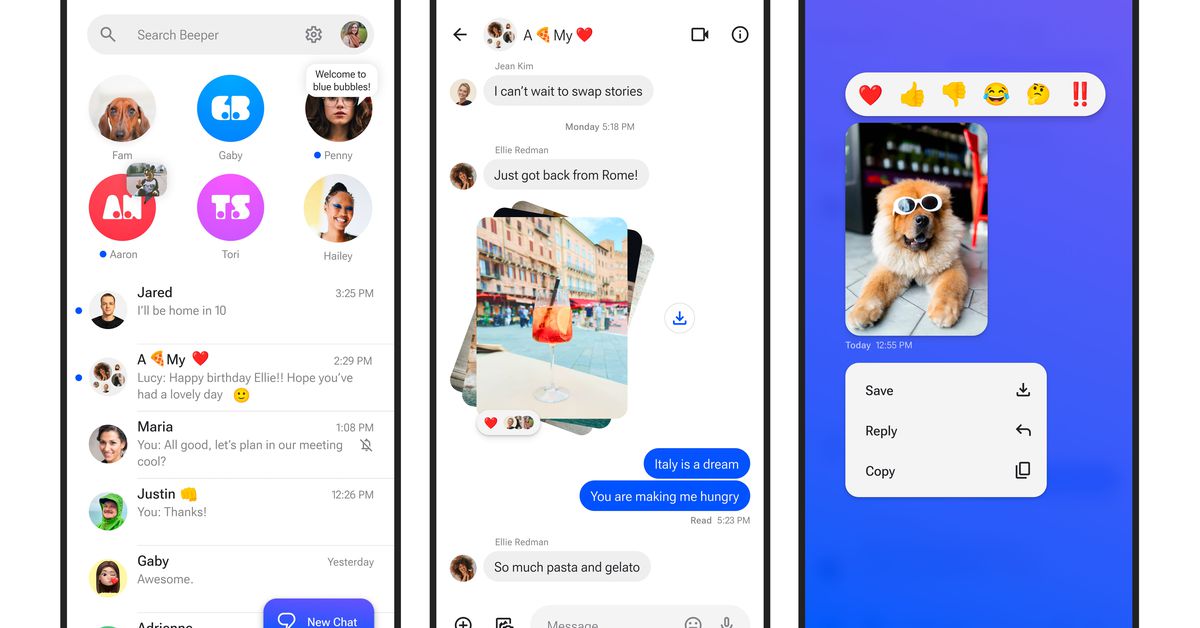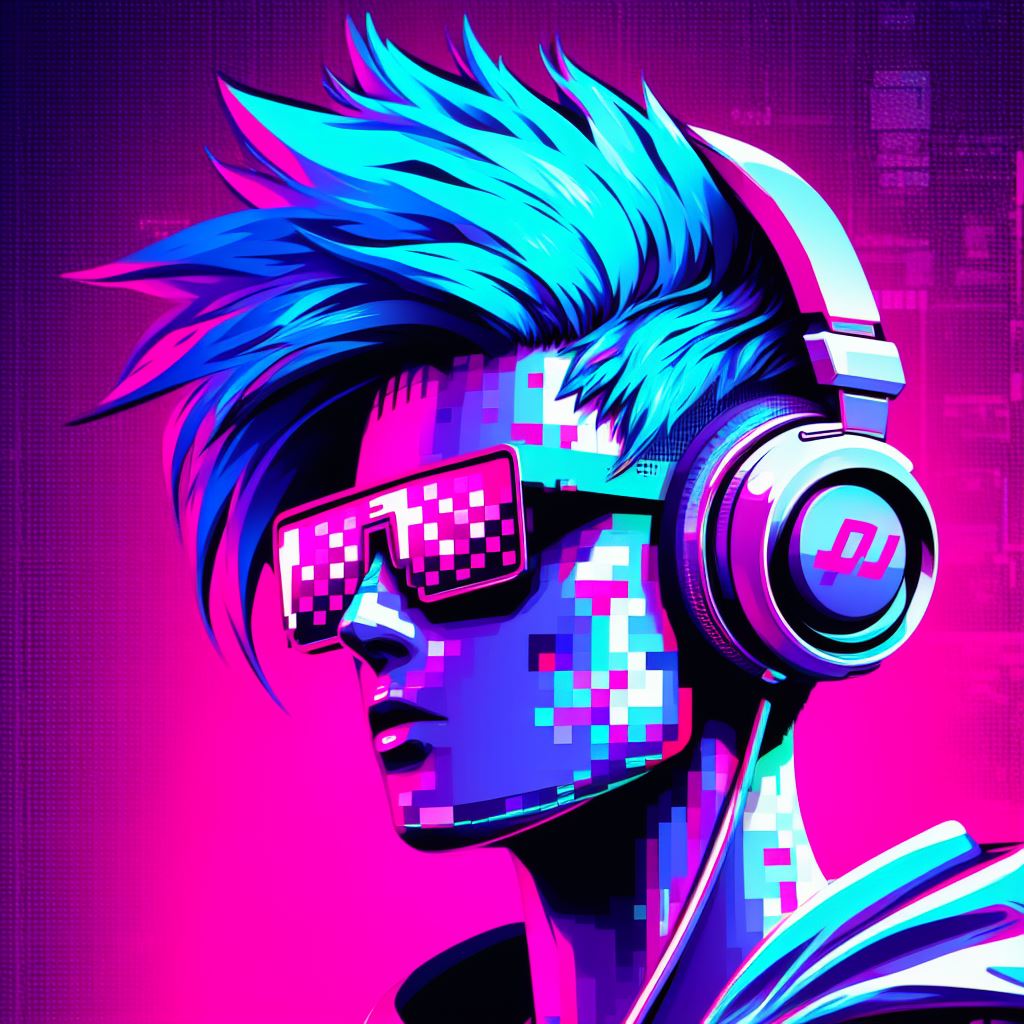- cross-posted to:
- technology@beehaw.org
- cross-posted to:
- technology@beehaw.org
• A new Android app called Beeper Mini allows users to send iMessages as blue bubbles from non-Apple devices.
• Beeper Mini bypasses traditional iMessage hacks by directly sending iMessages from Android devices.
• The app has been praised for its smooth functionality, sending messages seamlessly between Android and iPhone users.
deleted by creator
Exactly. I don’t understand the interest and effort put in these makeshift solutions to integrate into a closed ecosystem managed by a company with so little interest in building interoperable solutions.
They’re a cancer to the computing industry that is metastasizing, let’s not help them at that.
Fuck apple and their walled garden.
I don’t disagree with you, but open source has a long history of this sort of hostile forced-interoperability. Look at stuff like uBlock, there’s a real case to be made that it shouldn’t need to exist, and yet someone built it. Hostile “patching” of proprietary systems is not ideal, but fix barriers help in the short term.
They are going with USB C and RCS messages in the next iphone though. This is good news. The android imessage app is very late, considering.
deleted by creator
Yeah fuck apple in the ass…
Hate to say it but who gives a fuck?
Just use signal.
The hardest thing about switching communication apps is that you have to convince everyone you talk with to switch as well. I’m stuck in WhatsApp because that’s what my friends and family all use.
Right? I feel it’s really snobby and disingenuous to just snap back and say “just ditch that and use so and so messaging app”, as if messaging platforms didn’t require your direct peers to also use them. As long as messaging platforms operate as walled gardens, we have little say on what apps we use. We’re at the mercy of the general populace and that’s all there is to it, at least until the DMA changes things. I really tried to make people jump ship from WhatsApp to telegram during what seemed like a mass exodus from even businesses (yeah bad choice but I didn’t know back then), ended up back on WhatsApp some 3 months later with my tail between my legs, nobody stayed on telegram even though a ton of people downloaded it and jumped in. Now imagine trying to get them all to use a privacy-focused app that gives them a hard time using it in multiple devices. Convenience is the reason why Meta, Apple, Google, MSFT, etc. are on top. You can’t expect the general populace to sacrifice it for privacy, not after continuously giving up freedom and privacy for the sake of convenience for decades in the digital space.
People who say that are essentially saying “stop using the messaging app that allows you to talk to everyone regardless of platform and use a proprietary walled garden where you can only talk with those people also using that same app.”
At least the iPhone messages app lets you send SMS and iMessage, switching seamlessly.
I have to convince every one of my friends to switch because they all use SMS/iMessage. Outside of the US, you would have to convince every one of your friends to switch from WhatsApp.
I’d love to, but none of my friends use it unfortunately
After 3 years of use of signal, I have converted my Mom which cares about privacy too from shows she seen. Which allowed us to convert my Brother, with it being the main discussion app. I also converted my SO because of a problem we had on messenger that was scary, finally I was able to move my Best friend, which is also a member of the DND group I started which moved to Signal because others (Brother, Best Friend) where already on Signal
I got lucky. Back when that privacy scare with Whatsapp made mainstream news my Aunt asked in the extended family chat what alternatives there were. I responded that I use SIgnal with my friends (all 2 of them on Signal at the time) and just like that everybody switched. 2 hours later my entire paternal family are on Signal, and still are.
Damn I should have pushed harder when that incident with WhatsApp was all over the news. Only a few of my friends and a couple of family members switched.
deleted by creator
Sorry, but that’s a pretty arrogant thing to say
Not to mention absolutely ridiculous. Dumping friends over their preferred messaging platform is literally what the green bubbles problem is.
There’s been some social discrimination occurring around people who don’t have blue messages being excluded, or being seen as poor. Not a great use base but the fact I am even aware of blue Vs green messages means some people do.
This is the only semi-legitimate reason I can get behind. For kids in grade-school.
If anybody outside of grade-school brings this up, I would laugh and ignore.
iPhone users be like “but I paid $1200 for this blue bubble!”
1200 for a shitty subpar phone
And a software design 15 years old. None of the added stuff like notification drawer and updates over air is by Apple.
I’ll just continue to use my old strategy of not voluntarily communicating with people who care about what color my text bubble is.
At this stage in the game, isn’t that basically the only difference?
I’ve never understood how this became an issue of shaming and exclusion.
Literally just star bellied sneetches.
It’s not the only difference. It indicates the difference in experience parties receive. Higher quality pictures & video, E2E encryption are some of the differences. I’m not shamed for being on android but I can’t have the same quality conversations without convincing lots of people to use something like signal (which I do use with those I have convinced).
LOL. Thanks for the sneetches comparison!
Fucking insane a 16 year old kid figured it out.
It’s always wild to me thinking how good kids are with tech these days to be able to crack something like this (assuming it’s true).
Maybe it’s because I’m getting older, but it always seems to me that kids are living in a world where they need to as present in their digital realities as much, if not more than, their actual ones. At work it seems like they are trying to be in two places at once sometimes.
I wonder how much of that is down to their real world sucking and their digital world being pretty cool.
It’s what naturally happens when smart people have free time. And teenagers have a lot of that.
And teenagers have a lot of that
._.
Most kids are clueless with tech to be honest. Yes they know how to use it, but they have no idea how it works behind the scenes. This has pretty scary consequences on how they are easily manipulated or scammed.
Some of them are very smart, sure, but on average I’d say they are less tech savvy than Gen X and millennials who grew up at a time you couldn’t use computers without some kind of knowledge of how it works (and smartphones didn’t exist).
Right, I have to teach shortcuts to our young intern the exact same way as i had to do with my grandma. All the ui’s are so smooth now that even a context menu is too much.
deleted by creator
im good thanks
Crazy to think this is just because of a different colored bubble
It’s not the color of the bubble. It’s the downgraded chat experience: grainy pictures, pixelated videos, and no E2EE.
Our kid was at a sleepover, recently. We got a video of all the kids playing together, but because it wasn’t iPhone to iPhone the video was a low resolution pixelated mess.
Yeah, my sister-in-law has an iPhone and all of my wife’s pics and videos turn to garbage in transit. For the longest my SIL just thought Android cameras were terrible and it locked her in to iPhones at upgrade time - which is exactly what Apple intended.
That’s the carrier requiring really rediculously small sizes for MMS.
If I remember correctly AT&T is still limiting videos to 2MB tops. Which is crazy.
And Apple forcing shit quality on ALL MMS, even when the carrier allows higher quality/size.
iOS can’t send hi quality videos or images over SMS. It’s a choice made by Apple.
I can send large videos (more than 50mb, for sure) over SMS from my Android phone on Verizon to a Verizon iPhone. They receive it in same quality. When they send it back, the iPhone butchers it.
Verizon, unlike other carriers, doesn’t seem to have an MMS size limit.
What’s really frustrating is MMS is just a web server on the other end. Since the time of data connections (~2005) vendors could’ve easily made it so MMS on data-capable devices is transported to the web server over data rather than through the voice channel frames (which is what SMS and MMS do).
Though if you had a data-capable device back then, you had to get a data plan to send MMS, so apparently this is what they were doing. They just don’t want to upgrade the MMS hosting servers and have the extra traffic.
I mean, I have the same problem on Android talking to android friends who don’t use an rcs-coompatible messaging app. Which is more rare than it used to be, but still.
Again, that’s the carrier limitation at that point.
If you were both on Verizon, which doesn’t seem to have an MMS limitation, this wouldn’t happen.
Which exposes that Android can do it, when the network allows it, while iPhone never can.
What? iPhone can do it. If the network allows it. Same as Android.
Also. Verizon has severe MMS limits. Which are less severe if you’re using their proprietary app.
deleted by creator
T-Mobile has a 1MB limit for MMS
Right, there you go.
Because Apple decided all media over SMS should be sent in a shitty downgraded form.
This is all on Apple wanting to make iMessage look better than SMS, and Apple look better than everyone else (and to be fair, iMessage is the right approach to the SMS issue, just not as a walled-garden version).
iOS can’t send hi quality videos or images over SMS. It’s a choice made by Apple.
I can send large videos (more than 50mb, for sure) over SMS from my Android phone on Verizon to a Verizon iPhone. They receive it in same quality. When they send it back, the iPhone butchers it.
Verizon, unlike other carriers, doesn’t seem to have an MMS size limit.
So Apple and carriers are to blame for this.
So, it’s an issue of Apple intentionally withering down the quality if it’s not iPhone-iPhone, rather than “incompatibility”
No… When you send a “blue bubble” photo on an iPhone the file size is around 1.5MB. When you send a “green bubble” photo I think they’re resized down to less than 300KB.
Any photo larger than that won’t be delivered by some carriers. Also while iMessage photos default to HEIF format - the same compression algorithm as Blue Ray videos - MMS uses JPEG which doesn’t have a target file size feature. All you have is the width/height in pixels and an arbitrary “quality” scale.
To guarantee your photo will never be over 300KB you need to set the width/height/quality to a number that will often be under 100KB… and that’s what Apple does.
Android has a size setting, and you’ll get a delivery failure error if you set it too high for the recipient’s carrier… a lot of carriers do support larger photos… But Apple doesn’t bother with that - they want it to “just work”. Which means 100KB for green bubble photos.
The reality is quality is always going to suffer - converting an image from HEIF to JPEG is a bad idea - it’ll never look anywhere near as good as the original no matter what resolution or quality the compression is set to.
Also… iPhones don’t even take ordinary photos… by default every “photo” is a short video. When you send those to another iPhone, they get the video. Green bubbles either get a still image or worse a 100KB five second video.
… So it’s still an iPhone issue … Also, i really don’t know what this “blue bubble”/“green bubble” is referencing (other than it being chats)
If you own an iPhone, when you’re texting with a person who uses iMessage, your outgoing messages have a blue background. When you’re texting with someone who doesn’t or can’t use iMessage (usually because they use an Android device) your outgoing messages have a green background. And since the message backgrounds are kind of shaped like speech bubbles from comics, they’re called bubbles.
The design is noticeably worse for the green bubbles; the contrast isn’t as good and the color scheme doesn’t seem to match as well as with the blue bubbles. And the fact that it’s the iPhone users’ outgoing messages—not the message of their recipient—that show up in this lower-fidelity way has a pretty powerful psychological impact.
Ostensibly the color difference is so that users know when their messages are being encrypted. But in reality, it seems pretty clear that Apple keeps this in place as a marketing tool, to encourage peer pressure so that users encourage other users to get iPhones.
And it works. Studies and reports keep coming out showing that, among high school students particularly, peer pressure against Android users is considerable; and even for adults, it’s not uncommon for Android users to be left off of group texts entirely.
There are other, more meaningful differences: like the fact that non-iMessage users receive photos and videos in much worse quality (which Apple’s upcoming RCS support should fix), and chats are only end-to-end encrypted between iPhones (which Apple’s implementation of RCS probably won’t fix). But the green and blue bubbles (which RCS definitely won’t fix) are, by Apple’s design, the thing that everyone is hung up on.
It’s still an iPhone issue of butchering quality when sending over MMS. Carriers are partly to blame, but even on Verizon which has no apparent MMS size limit, iPhones till butcher images.
See my other comments. I’ve tested this. It’s Apple making anything non-iMessage seem inferior. Not that they have to, but it makes people think iPhone is superior when it’s by design.
Yes. That’s exactly it
I have the same problem sending to a slew of Android friends from my Android phone. It depends on the phone they have, messaging app, and carrier.
I mean, I guess the above is partially correct but it’s also not the whole picture. But Apple = bad so it doesn’t matter, right guys?
It depends on if they’re using RCS or not.
“Never attribute to malice that which is adequately explained by stupidity”
It’s obvious they’re restricting the quality but it could be that they implemented the MMS handling in 2008, when other phones could only support 3gp and the carriers couldn’t handle high bandwidth. I’d bet they haven’t bothered to update it since, and do the absolute bare minimum to keep it compliant with the carriers.
With all the so-called innovation and their absurd price tags , you’d think they would’ve updated it in the last 15 years
Intentional ineptitude resulting from malice is still malice.
My Treo on Verizon in 2006 could send 10mb videos.
Over MMS? Without quality loss? To someone not on the same network?
No way was Verizon allowing 10MB videos over MMS in 2006. They don’t today. And that was the really early days of MMS when you were lucky if anything got delivered.
As I said, on Verizon. May have forgotten to say to other Verizon phones.
And yes, they did, and the do. I can send 50mb videos over MMS to Verizon iPhones. I’ve done it. Last time was last year as another test.
Verizon doesn’t seem to have an MMS limit.
But keep on gaslighting me and telling me I didn’t perform this test between a Verizon iPhone and a Verizon Android that I control.
The iPhone receives the video just fine. You can even see the size of the video. But when it sends it back, iOS butchers the quality.
I just had my Samsung-using friend send me (Motorola) a video on MMS . The quality suuuucked. We’re both on AT&T.
Its totally valid I think to blame Apple for not supporting RCS earlier (and for their reasoning behind it - platform locking). But blaming them for MMS quality sucking is pretty wrong. That’s almost entirely on the carriers.
Edit: actually I’m not even sure it’s fair to fully blame Apple. Google is supporting it via their Messenger but only because they’re paying for a ton of the infrastructure themselves (and likely justifying it by scraping every single message people are sending with it). Carriers have been notoriously bad about supporting it.
Might be more valid to blame Apple for never opening iMessage to other platforms. You could also say the same about other messaging system interop limitations, too.
Well, obviously. It’s just a protocol. Why wouldn’t they be able to make it cross-platform if they wanted to?
If they’d sent a link instead of the video itself you’d have seen the whole thing though.
Which is more convenient?
And this is 2023, why shouldn’t I be able to just send a video straight to another person if they’re the only one seeing it?
I don’t support big grey making that decision for me
You’re missing my point, but it looks like you’re not the only one. Your friend should have sent it differently.
I mean you just missed your chance at clarifying said point in the very comment I’m about to respond to.
Try again?
They’re saying that MMS is trash and everyone should know that by now.
Might be the only thing he’s been right about, but poor writing skills make his statement… let’s say, ambiguous.
Nah I’m good. I’m not getting paid to be your tech support here, if you’re not going to pay enough attention to understand plain English that’s on you.
It’s cool silly, at least I’m able to write cogent statements.
Original statement was
It’s not the color of the bubble. It’s the downgraded chat experience: grainy pictures, pixelated videos, and no E2EE.
Our kid was at a sleepover, recently. We got a video of all the kids playing together, but because it wasn’t iPhone to iPhone the video was a low resolution pixelated mess.
All you said was a half-coherent statement about sending a link instead, to which I attempted to respond. Now you can’t handle getting called out for having spaghetti for neural pathways, and here we are. Let me know if I need to buy you some crayons for further explanation.
Good luck in life, looks like you’ll need it 🤭
The funny thing is MMS is effectively a link.
When you send an MMS, it’s uploaded to a server via http where a link is generated. Then the link is sent to the other phone, where the MMS service retrieves the file via that link. We just don’t see it happening.
Only happens in Muricaland.
Not just in 'Merica, also in Canada eh.
People are fucking stupid.
Total time spent between all of the discussion, hand-wringing, programming, and reporting, this has got to be be pretty high on the list of colossal time-wasters.
deleted by creator
Doesn’t it have to do with Apple’s inability to play ball with Google and use a more universally accepted and accessible messaging protocol?
When people don’t know how things work, and can only associate bubble color with bad images, video, and group messaging issues, then bubble color is meaningful.
deleted by creator
It has become for teens. It’s like wearing the right brand. To then, if you’re a green bubble, shame on you.
Of course it originates from the degraded experience, but at the moment, it all came down to the color of the bubble without taking into consideration the features/experience.
To those people it definitely is. And to Apple as well.
Counterpoint: teenagers.
Is this available on iOS?
Lol
As nice as it would be to have all my messaging in one app rather than across a half dozen, I just can’t picture paying a monthly fee to do it.
deleted by creator
Might be good for business owners, having a single inbox.
Exactly, either setting themselves as an alternative to Twilio, or to be acquired by them. Companies will pay more than $2/month/user for customer engagement on all platforms.
I’m not sure what the business model is here (I have no interest in iMessage) but unlike the previous ones this solution doesn’t require a Mac mini farm. Messages are sent directly from the Android device.
So it doesn’t require a monthly fee to be profitable.
Stop trying to make this a thing
Sunbird worked - I was in the beta - but it turned out to have no encryption whatsoever. I am skeptical.
Sunbird just relayed messages back and forth using a Mac mini in a warehouse. They probably had something that read the messages app on there and sent to their app on the phone through their servers, and seemingly forgot to encrypt anything during this process.
This is actually sending messages as iMessage. It’s been reverse engineered which is an incredible feat, iMessage has been out like …10+ years? And no one figured it out yet until this 16yr old rocks up.
Doesn’t iMessage require some sort of Apple-issued device id? A key, unique to a device, hard-coded in the SoC? (which is easy to block if over-used).
Which is why hackintoshes used to require crazy workarounds to get this working, even with Apple’s own software, if I remember correctly (never tried myself, could be wrong).
How did they get around this? (did they?)
It does, the article actually mentions that. Yes, they did get around or reverse-engineer it. The article does not describe how, though I imagine it’s doing the same sort of workaround that Hackintoshes have to do. Honestly, it’s quite a feat.
Thanks, the second link talks about this in the
"data.plist" and Mac serial numberssection.
So if the app will be open source like they say, can’t we just build it ourselves and not pay $2/mo?
deleted by creator
There shouldn’t be any back end beeper servers with this implementation if they really do what they say and interface directly with Apple servers.
It’s a bridge for notifications. Since Apple’s APN notification servers require a persistent connection to work, meaning that the application must be running continuously to receive notifications, the Beeper servers push those notifications (messages) to your phone.
This means that the application does not need to be running continuously to receive messages.
Exactly. They host the Apple equivalent to GMS, which is called APN (or is it ANP? Apple Notification Protocol? I forget, but the Bubbler Mini devs explain it well)
deleted by creator
Here’s a simple picture with minimal reading required.

This is very different to the technology used in the free/wait-list Beeper Cloud app and all the other previous attempts at an iMessage for Android app.
To summarize:
All messages are sent directly between your device and Apple’s servers. You do not even need an AppleID. There is a cloud server involved but it’s only job is to send push notifications to Android so they app knows when to download new messages (securely with iMessage encryption) from Apple’s servers.
No message contents are sent through the cloud server, it just notifies your device when there are new messages. This is necessary because Apple servers obviously do not support Android push notifications.
Running BlueBubbles at the moment, eagerly awaiting someone to build a self hosted implementation of this so I can stop relying on my macos VM.
This implementation I think also allows you to use the phone number of your android device, which is a feature that not even the BlueBubbles method has been able to do.
deleted by creator
Kind of, but it’s more complicated. I’m not sure if the app itself will be open source, but currently, the method they use is. Either way, the hardest part is already done, but you still need a client (maybe; they might open-source it) and a notification server. I’m planning to attempt to build a Matrix bridge if I have enough time and it’s not beyond my skills, but if you don’t want the messages to be decrypted by the server, making the notification server and maybe client would be really difficult.
I’m pretty sure the point of this is that the official iMessage servers are the notification server.
Sort of.
All messages/etc are sent using iMessage encryption directly between your phone and Apple’s iMessage servers.
But there is no Android push notifications from Apple’s servers.
So in order to be notified about new messages in a timely manner without killing your battery/data plan a cloud server is required to trigger your phone that a message has arrived so your phone can then request the message from Apple’s servers.
This is actually a really common implementation, many apps use Firebase or similar to handle push notifications that are only used to trigger a “pull” of a larger chunk of data.
The push notifications being used here don’t contain any private data, they just tell your device when to collect that private data securely.
Ah, I see what you mean. That’s pretty neat architecture.
Don’t see why not. Whats the timline on this?
Its already available for download and use, but I can’t find the source anywhere other than a Python proof of concept project that beeper purchased the rights to to make this app.
Open source doesn’t mean it can be very conveniently free. Besides backend, building can be difficult, as you see in paid libre apps like Ardour
no, thx
Can some American please explain this European why this is such a big deal?
It’s not, it’s a superficial opinion on color and functionality that apple and Google want you to think is a big deal but in reality it’s two companies using two different protocols and they want you to pick up their product over the over. Even Americans don’t know why it’s a big deal, they see green in iMessage and freak out.
Sounds like you’re an iPhone user, or at least someone who doesn’t have kids with Android phones and doesn’t participate in group activities where the people primarily use iPhones.
I won’t bother explaining it all, but the real issues are group chats that contain both iPhones and Androids, and image/video quality, reactions, etc. The issues are bad enough that kids especially get left out of group chats over it, and bullying incidents are widely reported (and I’ve seen it first hand)
As an android user with a wife and kids that have iPhone, it’s obnoxious that any video my wife and kids attach to a group message gets auto-reduced to sub-potato quality. We send them with Facebook messenger now but I can see where other groups might simply exclude the people with Androids to avoid the need to use alternate apps. Apple k ows what it’s doing.
Anecdotally, in my experience everyone in the UK just uses WhatsApp for group chats
Is the app already down? I can’t even read reviews of it on Google Play store
Other way, actually; it’s only just come out. Doesn’t look like there are any reviews yet.
Seems available to me but I’m not paying $2/month to use it. I’d buy it but I’m not creating a perpetual subscription.
























